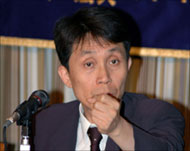School offers lesson in Korean unity
North Korean residents of Japan have found unlikely allies in a group of politicians from Seoul who have vowed to help defend a school that teaches Pyongyang’s doctrines in Tokyo – and which the city’s governor wants to tear down.

Supporters of the Edagawa Chosun School, in central Tokyo’s Koto Ward, are hoping to stave off a death sentence after the Tokyo Metropolitan Government filed a lawsuit demanding the return of the 4140 sqm plot, as well as Y400 million ($3.7 million) in compensation for what it claims is illegal use of the land since the lease expired in 1990.
The General Association of Korean Residents in Japan, which is allied with North Korea, operates the school and says it has neither the funds to pay nor the obligation. And its backers agree.
“It has been 100 years since Japan started its colonial rule of the Korean Peninsula and 40 years since Tokyo and Seoul established diplomatic relations, but still our people face discrimination and problems in Japan,” said Yoo Ki Hong, a member of South Korea’s Uri Party.
“The Edagawa school is a symbolic example,” he said. “In 1940, under the pretext of the area, where Korean people then lived, being re-developed for the 1941 Olympic Games, thousands of Koreans were forced to move to a site used as a rubbish dump. There, they gradually built their homes and the school, making it the cradle of Korean people in Japan.”
Rent payments
In 2003, however, Tokyo’s nationalist governor, Shintaro Ishihara, requested that the Koreans pay the rent in arrears and buy the land – for a whopping Y1.3 billion ($11.9 million) – or return it to the city. If that happens, it is likely to be turned into apartment complexes.
|
“In 1940, under the pretext of the area, where Korean people then lived, being re-developed for the 1941 Olympic Games, thousands of Koreans were forced to move to a site used as a rubbish dump” Yoo Ki Hong, |
A spokesperson for the metropolitan government refused to comment on the case on the grounds that it is presently before the courts. It is not clear when a ruling might be made in the case.
A 1972 agreement with Tokyo had allowed the school to use the land for free and talks started before 2001 to enable it to purchase the land outright, although the eventual price tag Ishihara is demanding was not anticipated.
Agreement
The Korean side argues that the Tokyo government should stick to an agreement reached in 2000 that enabled local residents to buy the land on which their houses stood for 7% of market value due to “historical circumstances”.
 |
|
Lawyer Shim Jae-whan has taken |
“The Tokyo government has filed a lawsuit demanding the land fee for more than 20 years, but really this is an attack on the Korean nation and the rights of its people,” said Shim Jae-whan, a lawyer who is fighting the case.
“The suit is linked to the issue of the abduction of Japanese nationals by North Korea and it is simply taking advantage of anti-North Korean sentiment.”
A request to meet with Ishihara has gone unanswered, he said.
Detente
“I went to the school today, the first time a South Korean politician has visited a North Korean school,” said Hong. “Five years ago, before the summit between Kim Dae Jung and Kim Jog Il, I could not have imagined that; but now the frozen relationship is melting.
“I believe that in the not-so-distant future our countries will be reunified and so the children at this school will be our children too,” he said. “I felt there were some differences at the school to a South Korean education, but this is an educational issue, not an ideological one.
“Education is a basic right for all people, including Koreans, and we will protect this right,” he added. “Our group has the support of 30 South Korean politicians, citizens, lawyers and Buddhist priests and we have come to Japan to protect Koreans’ rights after 60 years of oppression.”